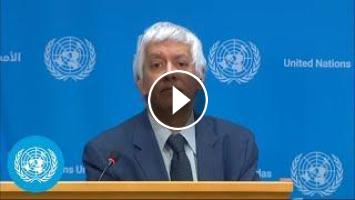Noon briefing by Farhan Haq, Deputy Spokesperson for the Secretary-General.
Highlights:
Occupied Palestinian Territory
Under-Secretary-General for Peace Operations
Syria
Security Council
Haiti
Sudan
Holocaust
Guest Tomorrow
Honour Roll
OCCUPIED PALESTINIAN TERRITORY
The Office for the Coordination of Humanitarian Affairs reports that large volumes of humanitarian aid continue to enter Gaza through the Erez and Zikim crossings in the north and Kerem Shalom crossing in the south.
Inside Gaza, OCHA says that aid cargo and humanitarian personnel are moving into areas that were previously hard to reach. Our humanitarian partners on the ground say the operating environment has improved significantly. The surge in supplies entering Gaza each day and the return of law and order has allowed aid organizations to scale up the delivery of life-saving assistance and services.
In central and southern Gaza, partners have resumed monthly food distributions with full rations. Yesterday, humanitarian organizations on the ground in Gaza transported 118 trucks of food parcels and flour from UNRWA warehouses to more than 60 distribution points in the south.
Across southern Gaza, UNICEF continues dispatching high-energy biscuits and ready-to-use food – enough for thousands of infants.
While food items currently account for the bulk of supplies that have entered the Gaza Strip since the ceasefire took effect, more medicines, shelter materials, and water, sanitation and hygiene supplies are expected over the coming days.
Yesterday, partners in southern Gaza distributed medical disposables and trauma management kits to 14 hospitals, as well as sexual and reproductive health kits to 28 health facilities – enough for 58,000 people.
Meanwhile, fuel deliveries in central and southern Gaza are keeping functional water wells, desalination plants and sewage pumps running.
And yesterday, our humanitarian partners delivered seven trucks of fuel to northern Gaza. This is the first such shipment since the ceasefire began.
The supplies will help power the back-up generators that are sustaining critical humanitarian services provided by UNRWA, the World Food Programme, the World Health Organization and other partners.
Also, in Gaza City yesterday, two of UNRWA’s primary health service points reopened – the Beach health centre and Daraj medical point.
Across the Strip, OCHA reports that most Palestinians remain at displacement sites – either because their homes are in ruins or contaminated by explosive ordnance, or because movement back to northern Gaza has not yet been allowed.
And turning to the situation in the West Bank, OCHA reports that the Jenin Government Hospital remains disconnected from water and electricity, and access is extremely difficult due to road damage. The facility is relying on dwindling water reserves from emergency tanks installed just weeks ago through an allocation by the Occupied Palestinian Territory Humanitarian Fund, which is managed by OCHA.
UNDER-SECRETARY-GENERAL FOR PEACE OPERATIONS
Starting this Saturday, the Under-Secretary-General for Peace Operations, Jean-Pierre Lacroix, will travel to the Middle East.
He will visit two UN peacekeeping missions and travel to Damascus to meet with caretaker authorities and Israeli authorities in Jerusalem.
Mr. Lacroix will first travel to Syria, where he will spend time at the UN Disengagement Observer Force (UNDOF) before visiting the headquarters of the UN Truce Supervision Organization (UNTSO) in Jerusalem.
Mr. Lacroix's priorities are to express his solidarity with and support for UN peacekeepers and to highlight the importance of mine action and removal of explosive remnants of war.
Full highlights: https://www.un.org/sg/en/content/noon-briefing-highlight?date%5Bvalue%5D%5Bdate%5D=23%20January%202025
Highlights:
Occupied Palestinian Territory
Under-Secretary-General for Peace Operations
Syria
Security Council
Haiti
Sudan
Holocaust
Guest Tomorrow
Honour Roll
OCCUPIED PALESTINIAN TERRITORY
The Office for the Coordination of Humanitarian Affairs reports that large volumes of humanitarian aid continue to enter Gaza through the Erez and Zikim crossings in the north and Kerem Shalom crossing in the south.
Inside Gaza, OCHA says that aid cargo and humanitarian personnel are moving into areas that were previously hard to reach. Our humanitarian partners on the ground say the operating environment has improved significantly. The surge in supplies entering Gaza each day and the return of law and order has allowed aid organizations to scale up the delivery of life-saving assistance and services.
In central and southern Gaza, partners have resumed monthly food distributions with full rations. Yesterday, humanitarian organizations on the ground in Gaza transported 118 trucks of food parcels and flour from UNRWA warehouses to more than 60 distribution points in the south.
Across southern Gaza, UNICEF continues dispatching high-energy biscuits and ready-to-use food – enough for thousands of infants.
While food items currently account for the bulk of supplies that have entered the Gaza Strip since the ceasefire took effect, more medicines, shelter materials, and water, sanitation and hygiene supplies are expected over the coming days.
Yesterday, partners in southern Gaza distributed medical disposables and trauma management kits to 14 hospitals, as well as sexual and reproductive health kits to 28 health facilities – enough for 58,000 people.
Meanwhile, fuel deliveries in central and southern Gaza are keeping functional water wells, desalination plants and sewage pumps running.
And yesterday, our humanitarian partners delivered seven trucks of fuel to northern Gaza. This is the first such shipment since the ceasefire began.
The supplies will help power the back-up generators that are sustaining critical humanitarian services provided by UNRWA, the World Food Programme, the World Health Organization and other partners.
Also, in Gaza City yesterday, two of UNRWA’s primary health service points reopened – the Beach health centre and Daraj medical point.
Across the Strip, OCHA reports that most Palestinians remain at displacement sites – either because their homes are in ruins or contaminated by explosive ordnance, or because movement back to northern Gaza has not yet been allowed.
And turning to the situation in the West Bank, OCHA reports that the Jenin Government Hospital remains disconnected from water and electricity, and access is extremely difficult due to road damage. The facility is relying on dwindling water reserves from emergency tanks installed just weeks ago through an allocation by the Occupied Palestinian Territory Humanitarian Fund, which is managed by OCHA.
UNDER-SECRETARY-GENERAL FOR PEACE OPERATIONS
Starting this Saturday, the Under-Secretary-General for Peace Operations, Jean-Pierre Lacroix, will travel to the Middle East.
He will visit two UN peacekeeping missions and travel to Damascus to meet with caretaker authorities and Israeli authorities in Jerusalem.
Mr. Lacroix will first travel to Syria, where he will spend time at the UN Disengagement Observer Force (UNDOF) before visiting the headquarters of the UN Truce Supervision Organization (UNTSO) in Jerusalem.
Mr. Lacroix's priorities are to express his solidarity with and support for UN peacekeepers and to highlight the importance of mine action and removal of explosive remnants of war.
Full highlights: https://www.un.org/sg/en/content/noon-briefing-highlight?date%5Bvalue%5D%5Bdate%5D=23%20January%202025
- Category
- United Nations
- Tags
- UN, United Nations, UNGA
Be the first to comment













